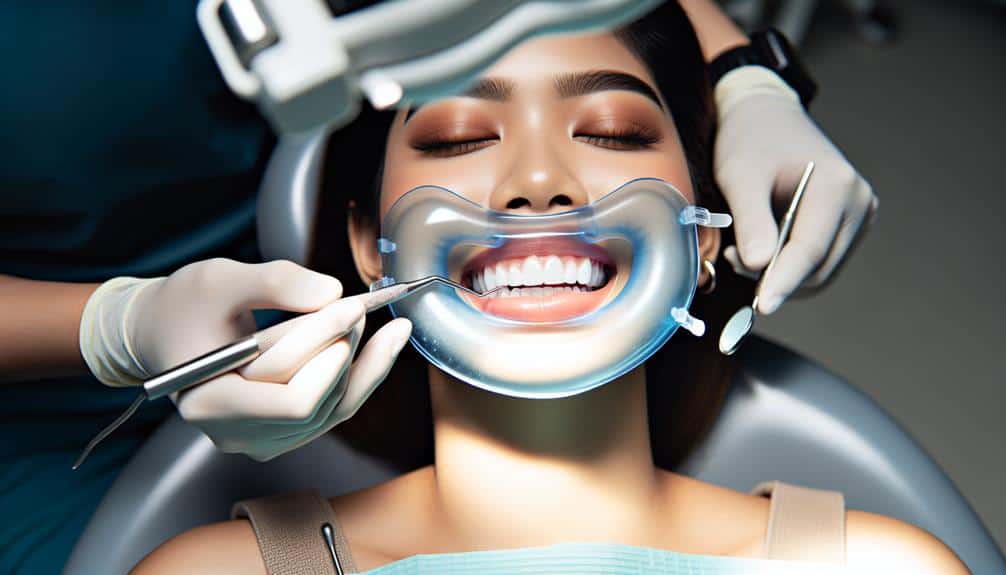When whitening your teeth, make sure to protect your gums by avoiding excessive contact with the whitening agent. Safeguarding your gums is essential to prevent sensitivity and damage. Remember to prioritize diligent oral care practices recommended by dental professionals and make certain the whitening process doesn't irritate your gums. Maintaining excellent oral hygiene and consulting with your dentist before whitening treatments can help you achieve a brighter smile without compromising your gum health. Ready to guarantee your gums are well-protected during teeth whitening?
Key Points
- Consult with a dentist before whitening to ensure gum health.
- Use protective barriers to shield gums from whitening agents.
- Prioritize gentle whitening methods to avoid gum irritation.
- Maintain excellent oral hygiene to support gum health.
- Avoid over-whitening to prevent sensitivity and discomfort.
Risks of Whitening for Periodontal Disease
When thinking about teeth whitening, it's important to be aware of the potential risks it may pose for individuals with periodontal disease. People with periodontal disease have compromised gum health, which can lead to increased sensitivity and irritation during the whitening process. The bleaching agents used in teeth whitening procedures can exacerbate these issues, causing discomfort and even potential damage to the gums if not carefully monitored.
To prevent risks associated with teeth whitening for individuals with periodontal disease, it's vital to consult with a dental professional before undergoing any whitening treatments. Dentists can assess the condition of your gums and provide personalized recommendations to minimize potential harm. They may suggest alternative whitening methods or products that are gentler on sensitive gums.
Additionally, maintaining good oral hygiene practices, such as regular brushing, flossing, and attending dental check-ups, can help prevent further complications and safeguard the health of your gums before, during, and after teeth whitening procedures.
Precautions for Gum Health
To ensure peak gum health during teeth whitening procedures, it's vital to prioritize diligent oral care practices and follow recommended guidelines provided by dental professionals. Gum protection is paramount during teeth whitening to prevent any potential damage or irritation. One key aspect of gum protection is ensuring that the whitening agent used doesn't come into contact with the gums excessively. This can be achieved by applying the whitening product carefully and precisely onto the teeth.
In addition to gum protection, maintaining excellent oral hygiene is essential. Brushing your teeth gently but thoroughly, especially after consuming foods or beverages that may stain your teeth, can help in preserving gum health during the whitening process. Flossing daily can also aid in removing any plaque or debris that may accumulate between teeth and along the gum line.
Recommendations for Sensitive Gums
For individuals with sensitive gums undergoing teeth whitening procedures, employing gentle techniques and using specialized products can help alleviate discomfort and prevent irritation. When dealing with sensitive gums during teeth whitening, it's important to take extra precautions to guarantee your gum protection and overall comfort. Here are some recommendations tailored to individuals with sensitive teeth:
- Use a Soft-Bristled Toothbrush: Opt for a toothbrush with soft bristles to minimize irritation on your sensitive gums.
- Choose a Gentle Whitening Toothpaste: Select a whitening toothpaste specifically formulated for sensitive teeth to avoid exacerbating any discomfort.
- Apply Desensitizing Gel: Consider using a desensitizing gel recommended by your dentist to help reduce sensitivity during and after whitening treatments.
- Avoid Over-Whitening: Be mindful not to overdo the whitening process, as this can lead to increased sensitivity in your gums and teeth.
Frequently Asked Questions
Can Teeth Whitening Cause Gum Recession?
Teeth whitening can potentially cause gum recession due to increased gum sensitivity. To prevent this, consult a dentist for advice on proper whitening techniques and use protective measures like dental barriers during the process.
How Long Should I Wait After a Teeth Whitening Treatment Before Getting a Dental Cleaning?
Like a fine-tuned instrument, your teeth need care after a whitening treatment. Wait at least two weeks before dental checkups to guarantee whitening effectiveness. This time allows your teeth to settle and protect against sensitivity.
Are There Any Specific Toothpastes or Mouthwashes That Can Help Protect Gums During Teeth Whitening?
To protect your gums during teeth whitening, consider using toothpaste and mouthwashes specifically designed for sensitive gums. Look for products with gentle ingredients like aloe vera or fluoride. These best oral care products can help maintain gum health during whitening treatments.
Can Certain Medications or Medical Conditions Make Gums More Susceptible to Damage During Teeth Whitening?
When it comes to teeth whitening, certain medications or medical conditions can heighten gum sensitivity and risk. Be mindful of medication interactions and underlying health factors that may increase susceptibility to gum damage during the whitening process.
Is It Possible to Reverse Gum Damage Caused by Teeth Whitening Treatments?
It's challenging to fully reverse gum damage caused by teeth whitening treatments. To promote gum health and prevent whitening side effects, consult your dentist. They can recommend treatments and provide guidance on maintaining oral health.



